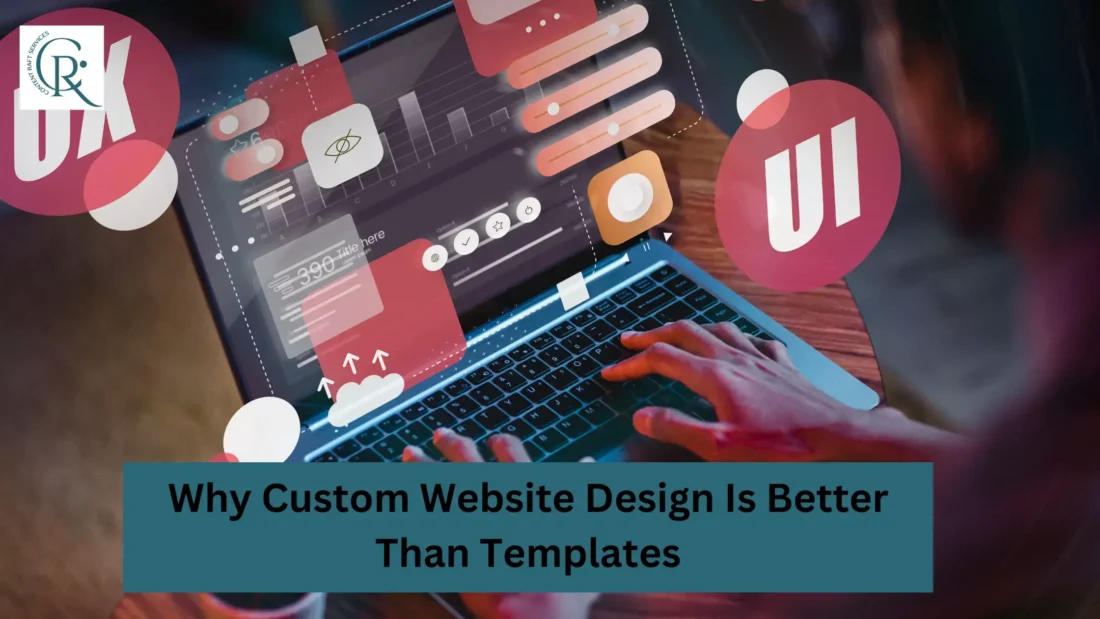
The Importance of a Strong Website
In today’s digital landscape, a well-designed website is essential for businesses looking to establish a strong online presence. Studies by SEMrush and Forbes indicate that users form an opinion about a website in just 0.05 seconds, making it crucial to create a visually appealing and engaging platform. Before launching a website, one of the most critical decisions is whether to opt for a custom website design or use a pre-designed template.
With approximately 1.09 billion websites on the internet, competition for user attention is intense. A unique, well-optimized, and user-friendly website can set a business apart from its competitors. Below, we’ll explore the advantages and disadvantages of custom website design compared to templates, helping you make an informed decision.
Whether you’re starting from scratch or looking to revamp your current site, our expert team at Content Raft Services is here to help. We specialize in custom WordPress website development in UAE.
Contact us today for a free consultation and take the first step toward a powerful online presence!
What Is a Template Website?
A template website uses pre-built layouts and design frameworks. Platforms like WordPress, Wix, and Shopify offer thousands of ready-made themes that can be installed and customized with your own content and branding.
Advantages of Templates
-
Lower cost: Ideal for startups or small businesses with tight budgets.
-
Faster launch: You can be live within days or even hours.
-
Beginner-friendly: No coding required; drag-and-drop editors are common.
-
Plenty of choices: Thousands of templates available across industries.
Limitations of Templates
-
Limited customization: You’re constrained by the design and layout of the template.
-
Generic design: Your site may look similar to others using the same theme.
-
Performance issues: Many templates are bloated with features you don’t need, slowing down your site.
-
Scalability concerns: As your business grows, a template may struggle to support new functionality.
-
Dependency on third-party plugins: Many templates rely on external plugins, increasing security risks.
When Templates Make Sense
Templates are a good starting point for:
-
Freelancers or solopreneurs needing a basic portfolio.
-
Small businesses testing a new idea or market.
-
Temporary or single-event websites (e.g., a conference or promotion).
-
Early-stage ecommerce stores with limited inventory.
For example, a local bakery launching its first website can start with a Shopify template to display its menu, location, and ordering form.
What Is Custom Website Development?
A custom website is built from the ground up based on your business’s unique goals, workflows, and branding. It involves strategic planning, UX/UI design, front-end and back-end development, content architecture, and integration with your existing tools or systems.
Benefits of a Custom Website
-
Unique design: Your website reflects your brand identity and stands apart from competitors.
-
Full control: Design, structure, and functionality are tailored exactly to your needs.
-
Better performance: Clean code and optimized architecture improve speed and SEO.
-
Security: You avoid unnecessary plugins and reduce attack surfaces.
-
Scalability: Easily add features, integrations, or pages as your business grows.
-
Advanced functionality: Build complex features like custom booking systems, dynamic search filters, or customer dashboards.
Use Cases for Custom Development
-
A logistics company needing custom forms and automated quotes.
-
A healthcare provider with HIPAA compliance requirements.
-
An education platform offering user registration, payment processing, and course dashboards.
-
A real estate agency integrating property listings with a CRM and lead tracking.
For example, a B2B tech firm may require a multilingual site with gated whitepapers, lead scoring, and HubSpot integration—features that most templates can’t handle efficiently or securely.
Custom Website Development Process
Custom website development is like building your dream home from scratch. Everything is tailored—structure, layout, design, content, and functionality—to meet your specific needs. Here’s how the process works:
1. Discovery and Planning
We dig into your business goals, industry, and audience. For example, if you run a luxury spa in Dubai, we’d explore what your high-end clientele values most—elegance, serenity, and easy booking—and plan the site around those needs.
2. Design
The visuals are built from the ground up to match your brand. Think of a fashion brand that wants a minimalist, stylish interface, or a restaurant that needs a bold, appetizing design with online reservations.
3. Content Creation
Good content tells your story. For a real estate agency, that means high-resolution property photos, compelling listings, and SEO-friendly descriptions to help you get found on Google.
4. Development
Your site is coded for speed, security, and flexibility. If you’re an e-commerce store, we can integrate inventory management, payment gateways, and customer accounts seamlessly.
5. Testing
Every feature is tested across devices and browsers. A financial services website, for example, needs to look and perform flawlessly on mobile, as many users check rates and apply for loans via their phones.
6. Launch
We deploy your site and ensure your domain, hosting, and SEO setup are good to go.
7. Post-Launch Maintenance
Your site stays healthy with regular updates, performance checks, and security enhancements.
Custom Website Design vs. Templates
Advantages of Custom Website Design
1. Unmatched Customization & Branding
Designed Just for You
Custom websites are built from the ground up to meet your exact needs—no compromises, no constraints. Unlike pre-made templates, they offer the flexibility to align every detail with your vision.
Stronger Brand Identity
A custom design gives your brand a unique visual identity that truly reflects your values, personality, and tone—helping you stand out in a crowded digital space.
Total Creative Control
From layout to features and visual elements, you have full creative freedom. This means a consistent, on-brand, and memorable user experience across the board.
2. Enhanced Functionality & Performance
Built for Speed
Custom-coded websites are optimized for performance, delivering fast load times and seamless browsing—essential for keeping users engaged.
Room to Grow
As your business evolves, so can your website. Custom development allows for easy scalability, ensuring your platform adapts to future needs.
SEO-Ready Structure
With a custom site, you can implement SEO best practices right from the foundation, giving you a better chance to rank higher and attract more organic traffic.
3. Greater Control & Ownership
Full Control of Your Platform
Unlike templates tied to specific platforms, a custom website means complete ownership—no restrictions, no platform dependencies.
Simplified Maintenance
Updating and managing your site is easier and more efficient, with fewer third-party compatibility issues to worry about.
Built-in Security
Custom development allows for tailored security measures that protect your site and data from potential threats and breaches.
4. A Unique User Experience
Stand Out from the Crowd
With a custom website, you can craft a distinct and impactful experience that grabs attention and leaves a lasting impression.
User-Centric Design
Custom websites focus on your audience’s needs and behavior, enhancing usability and encouraging interaction and conversions.
Strategic Content Delivery
A personalized website enables a refined content strategy, ensuring your message reaches the right people in the right way.
Disadvantages of Custom Website Design
1. Higher Cost
Custom websites require a larger upfront investment due to the extensive development process.
2. Longer Development Time
Building a custom website from scratch takes more time compared to using pre-built templates.
3. Technical Expertise Required
Businesses may need to hire professional developers, adding to the overall cost.
4. Ongoing Maintenance
Regular updates and security patches are required to maintain website performance.
5. Dependency on Developers
Businesses without in-house technical expertise may rely on external developers for maintenance and updates.
6. Risk of Over-Engineering
Adding unnecessary features can lead to complexity, increased maintenance costs, and slower performance.
7. Compatibility Issues
Custom websites require additional testing to ensure they function correctly across different devices and browsers.
Cost Comparison
| Feature | Template Website | Custom Website |
|---|---|---|
| Initial Cost | $100 – $2,000 | $3,000 – $25,000+ |
| Time to Launch | A few days to 2 weeks | 4–12+ weeks |
| Customization | Limited to template design | Fully customizable |
| Performance & SEO | May require heavy plugins | Optimized from the ground up |
| Security | Relies on plugin quality | Controlled and hardened |
| Long-term Value | Good for short term | Strong ROI over time |
When It Makes Sense to Use a Template
While custom websites offer significant advantages, using a template can be a viable option in certain situations:
- Budget Constraints: Templates are a cost-effective option for businesses with limited budgets.
- Time Sensitivity: Pre-built templates allow for quicker website deployment.
- Limited Technical Expertise: Website builders provide user-friendly drag-and-drop interfaces, eliminating the need for coding knowledge.
- Basic Website Needs: If the website only requires simple functionalities, a template may be sufficient.
Pros of Using a Template
- Cost-Effective: Affordable and often free options are available.
- Time-Saving: Reduces development time significantly.
- Ease of Use: User-friendly and requires minimal technical skills.
- Responsive Design: Many templates are optimized for various devices.
- Community Support: Access to forums and regular updates from template providers.
Drawbacks of Using a Template
- Limited Customization: Customization options are restricted, making it difficult to implement unique features.
- Generic Design: Templates are used by multiple businesses, reducing uniqueness.
- Overhead Code: Unnecessary code can slow down the website.
- Lack of Control: Businesses are restricted by template provider limitations.
- Security Risks: Templates may have vulnerabilities that hackers can exploit.
- Compatibility Issues: Templates may not be fully optimized for different browsers and devices.
Conclusion
Choosing between a custom website and a template depends on your business goals, budget, and technical requirements. While templates offer a quick and cost-effective solution, they lack the flexibility, scalability, and uniqueness of custom-built websites. Investing in a custom website ensures a strong online presence, improved user experience, and long-term business growth. If your business aims for brand distinction and future scalability, custom website design is the superior choice.
FAQs
1. What are the benefits of custom website design?
Custom website design offers:
- Unique branding: Tailored to reflect your brand identity.
- Better user experience: Designed with your audience in mind.
- Scalability: Easily updated or expanded as your business grows.
- SEO optimization: Clean, optimized code for better search engine rankings.
- Competitive edge: Helps you stand out from competitors using templates.
2. Is it better to build a website from scratch or use a template?
It depends on your needs:
- From scratch: Ideal for businesses needing full customization, scalability, and specific functionality. It’s more time-intensive and costly but offers flexibility.
- Template: Quicker and more affordable, perfect for startups or small businesses with limited budgets and general needs.
3. What is the difference between web design and website template?
- Web design refers to the overall process of planning, conceptualizing, and creating a website’s layout, structure, and visual elements.
- Website template is a pre-designed layout that can be customized to some extent. It’s a ready-made starting point, not a fully personalized design.
4. Do professional web designers use templates?
Yes, some do—especially for faster turnaround or budget-conscious clients. However, many professionals prefer building custom designs for projects that require a unique brand presence, complex functionality, or enhanced performance.
